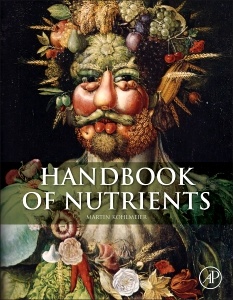Nutrient Metabolism (2nd Ed.) Structures, Functions, and Genes
Auteur : Kohlmeier Martin

Nutrient Metabolism, Second Edition, provides a comprehensive overview of the supply and use of nutrients in the human body and how the body regulates intake. Chapters detail the principles determining digestion and absorption of food ingredients and how these compounds and their metabolites get into the brain, cross the placenta and pass through the kidneys. Each nutrient?s coverage contains a nutritional summary that describes its function, its food sources, dietary requirements, potential health risks if deficient, and impact of excessive intake. This handbook contains the latest information on the scope of structures, processes, genes and cofactors involved in maintaining a healthy balance of nutrient supplies. Of interest to a wide range of professionals because nutrient issues connect to so many audiences, the book contains a useful link to dietary supplements.
1. Introduction2. Chemical senses3. Intake regulation4. Absorption, transport and retention5. Xenobiotics6. Fatty acids7. Carbohydrates, alcohols and organic acids8. Amino acid and nitrogen compounds9. Fat-soluble vitamins and food compounds10. Water-soluble vitamins and food compounds11. Minerals and trace elements12. Applications
Nutritionists, dietitians, food scientists, and biochemists who work with nutrition
- Latest research findings on health and clinical effects of nutrients and of interventions affecting nutrient supply or metabolism
- Each nutrient covered contains a nutritional summary describing its function, food sources, dietary requirements, potential health risks if deficient, and impact of excessive intake.
- Nutrient information immediately accessible--from source to effect--in one volume
Date de parution : 05-2015
Ouvrage de 898 p.
21.4x27.6 cm
Thèmes de Nutrient Metabolism :
Mots-clés :
Absorption; Acetate (acetic acid); Active ATP-driven transport; Agouti-related protein (AgRP); Alcohols; Amino acids; Antioxidant; Atherosclerosis; Beta-glucan; Binding proteins; Bioavailability; Biochemical databases; Birth defects; Bitter taste; Blood coagulation; Blood hyperosmolality; Blood-brain barrier (BBB); Bone; Breakdown; Calcium taste; Cancer; Cancer prevention; Carbohydrates; Cardiovascular disease; Chemesthesis; Chemical senses; Chloride; Chlorophyll; Cholecystokinin (CCK); Cognition; Conjugated linoleic acid (CLA); Cotransport; Deficiency; Dehydration; Detoxification; Diabetes; Digestion; Disaccharides; Docosahexaenoic acid (DHA); Electrolytes; Endocrine; Enterohepatic circulation; Enzyme cofactor; Esophagus; Ethanol; Excessive intake; Excretion; Facilitated diffusion; Fat; Fat taste; Fatty acids; Fecal volume; Flavonoids; Garlic bioactives; Gastrointestinal tract; Genetic databases; Genomics; Ghrelin; Heterocyclic amines; Hexoses; Hormones; Hydrochloric acid; Ileal brake; Innervation; Insulin; Intake; Intestinal sensing; Intracellular transformation; Ion channel; Isoflavones; Large intestine; Materno-fetal nutrient transport; Meaty taste (umami); Mechanoreceptors; Mediators; Melanocortin; Melanocortin receptor 4 (MCR4); Metabolism; Metabolomics; Methanol; Methylxanthines; Microbiota; Minerals; Molecular mechanisms of nutrient transport; Monocarbonic; Monosaccharides; Myristate (myristic acid); Nociceptors; Nutrient requirement; Obesity; Odors; Olfaction; Olfactory nerve; Oral cavity; Oro-cecal passage time; Osteoporosis; Overfeeding; Paracellular diffusion; Peristalsis; Personalized nutrition



